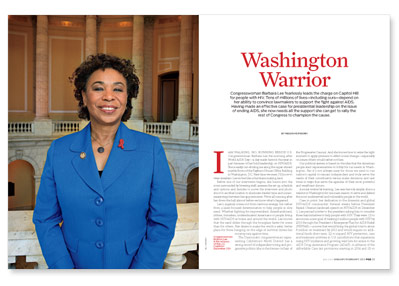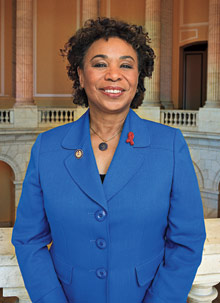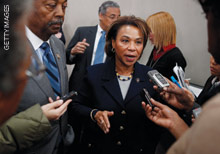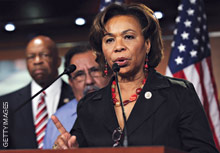
I am walking, no, running beside U.S. Congresswoman Barbara Lee the morning after World AIDS Day—a day made historic this year in part because of her bold leadership on HIV/AIDS. She is easily out-striding me along the super-shined marble floors of the Rayburn House Office Building in Washington, DC. Next time we meet, I’ll know to wear sneakers. Lee moves like a hurricane making land.
Before one of our interviews begins, she bursts into the room surrounded by hovering staff, assesses the set-up, schedule and options and decides to move the interview and photo shoot to another location to eliminate wasted time and unnecessary steps between her appointments. We’re all running after her down the hall almost before we know what’s happened.
Lee’s urgency comes not from nervous energy, but rather from a laser-focused determination to help people in dire need. Whether fighting for impoverished, disenfranchised, jobless, homeless, undereducated Americans or people living with HIV/AIDS at home and around the world, Lee knows that the sand slides through the hourglass faster for some than for others. Her desire to make the world a safer, better place for those hanging on the edge of survival drives her nonstop race against time.  The Democratic congresswoman representing California’s Ninth District has a strong record of independent voting and progressive politics (she is the former cochair of the Progressive Caucus). And she knows how to seize the right moment to apply pressure to effect social change—especially on issues others would rather not face.
The Democratic congresswoman representing California’s Ninth District has a strong record of independent voting and progressive politics (she is the former cochair of the Progressive Caucus). And she knows how to seize the right moment to apply pressure to effect social change—especially on issues others would rather not face.
Our political system is based on the idea that the American people elect representatives to lobby for our needs in Washington. But it’s not always easy for those we send to our nation’s capital to remain independent and truly serve the needs of their constituents versus make decisions and cast votes in ways that serve the agendas of their most powerful and wealthiest donors.
A social worker by training, Lee sees her role simply; she is a warrior in Washington for one main reason: to serve and defend the most underserved and vulnerable people in the world.
Case in point: her dedication to the domestic and global HIV/AIDS community. Several weeks before President Barack Obama’s landmark speech on HIV/AIDS on December 1, Lee penned a letter to the president asking him to consider three key initiatives to help people with HIV. They were: (1) to announce a new goal of treating 6 million people with HIV by 2013 through the President’s Emergency Plan for AIDS Relief (PEPFAR)—a move that would bring the global total to about 8 million on treatment by 2013 and would require no additional funds short term, (2) to expand HIV prevention, care and treatment activities in U.S. jurisdictions that experience rising HIV incidence and growing wait lists for access to the AIDS Drug Assistance Program (ADAP), in advance of the Affordable Care Act provisions starting in 2014 and (3) to order a review of federal and state laws, policies, regulations and judicial proceedings involving criminal cases against people living with HIV/AIDS.
At a time when Obama was preparing to launch his next presidential campaign in the midst of low approval ratings and a struggling economy, inviting him to stand so publicly on the issue of HIV was a big ask. But Lee knew he’s long been supportive of people with the virus and that he personally wants the end of AIDS to be a legacy for his administration. So she did the asking. Her face looked illuminated from within as she sat several feet from the president listening as he acknowledged each of her requests in his speech. It was understandable. Not everyone gets to claim they directly helped save the lives of 2 million people (currently, about 4 million get HIV care via PEPFAR; through a strategic reallocation of funds within the proposed FY2012 budget, an additional 2 million would be connected to treatment by 2013). Lee’s career tally is far higher, but 2 million lives spared is certainly nothing to sneeze at.
After Obama’s speech, the stage and podium were rearranged for a panel discussion led by CNN’s Sanjay Gupta focused on how the world can begin to end AIDS. Participants included Lee, Bono, Muhtar Kent (chairman and CEO of Coca-Cola), Alicia Keys, Florence Ngobeni-Allen (an HIV educator and woman living with HIV), Patricia Nkansah-Asamoah, MD, (an HIV doctor in Ghana), Senator Marco Rubio (R–Fla.) and Kay Warren (founder of the HIV/AIDS Initiative at Saddleback Church). Joining via satellite were President George W. Bush, Tanzania’s President Jakaya Kikwete, President Clinton and Sir Elton John. The event was jointly hosted by ONE and (RED), Bono’s organizations, and in the audience were global AIDS leaders, including Anthony Fauci, MD, of the National Institutes of Health; Ambassador Eric Goosby of PEPFAR; Michel Kazatchkine, head of the Global Fund to Fight AIDS, Tuberculosis and Malaria; executive directors of organizations that support the fight against AIDS; activists; advocates; people living with HIV; other members of Congress; and members of the National Security Council and the administration. Plus, a live audience tuned in on the Web.
It was a watershed moment in the history of AIDS, and Lee made the most of it speaking candidly about some of the stickiest subjects associated with HIV. “African Americans make up 14 percent of the U.S. population,” she noted. “But they represent 44 percent of all new HIV infections in our country. This is unacceptable.” (One of Lee’s central objectives is putting the plight of Americans of color with HIV into the context of the global pandemic. Early in her years of activism, she invited Bono to Oakland to see how similar disinfranchised African Americans were to people in need in other nations. When he picked up that mantle, the NAACP noticed and gave him its prestigious Image award. “A very unusual thing for a white Irishman,” she laughed.)
On the panel, Lee highlighted the need to reduce stigma, and she suggested that political leaders come together and get publicly tested for HIV to show people it’s OK to do so. She also called out the long lines for HIV medications in states like California and Florida (and others) as being immoral and unethical. “We have to find a way to provide these medications very quickly,” she said.
In light of her point, President Clinton raised the issue of securing generic pricing for AIDS medications in the United States for those who could not afford the drugs otherwise. He suggested the government negotiate with the pharmaceutical drug companies to lower prices in the United States for the next two years, until the Affordable Care Act kicks in fully and there would be different mechanisms for paying for treatment for the nearly 850,000 Americans (and counting) who are not taking the pills—pills that double, by the way, as prevention because when an HIV-positive person adheres to an effective treatment regimen, the risk of transmitting the virus can be reduced by 96 percent.
Clinton asked Lee directly if she would command an initiative to explore generic pricing for HIV medications in America. He knows she is the woman to do it; they worked closely together when he was in the Oval Office. “You know we’re going to follow-up and find a way to do this,” she said. Thanking Lee for her leadership, Clinton said, “You were one of the very first people who understood what was at stake.”
Lee still does. She said, “I am humbled and excited that we’re here today. I hope everyone sees how Congress and political leaders have put aside their partisanship and different points of view to say we’re going to work to ensure we have an ends to AIDS. We’re at a critical moment when we need to recommit. We’re winning this war, but we still have a long way to go.”
Indeed, we find ourselves at a flummoxing crossroads. At the exact moment global health experts agree we can start turning the tide on AIDS, even stopping it altogether in the next decade or so with the right strategic investments, the global economic landscape looks gloomy.
Days before the president’s speech, the leadership of the Global Fund announced that due to a lack of funding, it could not fulfill its next round (Round 11) of grants—grants that would have covered 25 percent of the worldwide funding for HIV/AIDS. That means the pressure to solve the world’s AIDS problem falls, as it has done time and time again, almost entirely back into America’s lap. We can’t begin to end AIDS unless we get lots more people onto treatment. And we can’t do that unless we have continued support from Congress.
But while some might be daunted by the combination of congressional gridlock, economic strife, diminished federal budgets, lack of jobs, an impending election (which means, usually, caution on tackling issues that can prove counterproductive to re-election) and “Fortress America” thinking, Lee remains unswayable in her devotion to clear HIV off the planet—while keeping those living with the virus on it.
She understands well the confluence of scientific insight and momentum that has led everyone ranging from global AIDS experts to the mass media to America’s commander in chief to publicly state that we have in our possession the tools to start to end AIDS. And she’s bringing the hammer.
“Make no mistake,” Lee says. “We have the money. The world definitely has the money to end AIDS.”
As we go to press, it appears that Congress will approve a 4 percent increase for global relief funding—much of which will help people with HIV/AIDS. And the word in the beltway is that Lee’s ability to get 103 members of Congress to sign a letter in support of foreign aid played a pivotal role in the backroom appropriations negotiations that may have protected monies in the Fiscal Year 2012 Department of State, Foreign Operations, and Related Programs Appropriations bill—a bill that funds PEPFAR and U.S. contributions to the Global Fund.
Few people have fought as long, as hard and as effectively for people with HIV as Congresswoman Barbara Lee. There has not been a single piece of HIV-related legislation taken to the floor of the U.S. House of Representatives that has not carried her signature. In fact, she coauthored or cosponsored many of the bills, including the three bills currently garnering attention in the House and in the media. The first is The Justice for the Unprotected against Sexually Transmitted Infections among the Confined and Exposed, or JUSTICE Act, which would allow prisons to provide condoms to incarcerated people and which calls for automatic reinstatement or reenrollment in Medicaid for people who test positive for HIV in prison before reentering communities. The second is The Repeal HIV Discrimination Act; it’s designed to eliminate discrimination in the law for those who have tested positive for HIV. And the third is The Real Education for Healthy Youth Act (REAL 2.0). It would expand comprehensive sex education while ensuring that federal funds are spent on effective, age-appropriate, medically accurate programs.  Together, these three bills would attack major drivers of the domestic HIV epidemic: lack of access to treatment, particularly among disenfranchised African-American men; the wrongful incarceration of people with HIV, which only serves to heighten the stigma and discrimination around HIV that frightens people away from testing and knowing their status; and, finally, a lack of lifesaving information about sexual health among youth.
Together, these three bills would attack major drivers of the domestic HIV epidemic: lack of access to treatment, particularly among disenfranchised African-American men; the wrongful incarceration of people with HIV, which only serves to heighten the stigma and discrimination around HIV that frightens people away from testing and knowing their status; and, finally, a lack of lifesaving information about sexual health among youth.
Understanding the huge role the clergy can play in the fight against HIV/AIDS, especially in African-American communities, Lee has cosponsored a bill with Congressman Charles Rangel (D–N.Y.) called the National Black Clergy for the Elimination of HIV/AIDS Act. It is currently in the Senate.
If that seems like a lot of legislation, it is. But Lee knows it takes laws to truly protect people, and she’s good at getting legislative deals done so that people’s health and safety are legally bound, not left to the whims of political maneuvering.
Lee cut her AIDS activism teeth with ACT UP in the Bay Area. In 1988, John Iverson and Maudelle Shirek (the “mother of progressive politics”) insisted that Lee, then on the city council, attend an ACT UP rally. “It was that moment I knew I had to do something about AIDS,” she said. “So when I was elected into the California legislature in 1990, I started working on needle exchange and whatever else I could. The city of Oakland tried to ensure we had an opt-out of the federal ban on needle exchange. When I came to Congress in ’98, it was a logical next step to continue the work in DC, but I wasn’t sure on what front because [at the time] no one in Washington was dealing with it.”
Lee took a close look at the numbers of AIDS cases in Alameda County, California, and became part of a group pressuring Donna Shalala (who was then secretary of the Department of Health and Human Services) to declare a public health crisis regarding AIDS in America. “She couldn’t do it—she wouldn’t do it,” Lee recalls. “So I decided I needed to really step up.”
One of her first moves was to craft, with Congressman Jim Leach (R–Iowa), the Global AIDS and Tuberculosis Relief Act of 2000. The groundbreaking legislation served as the framework for the Global Fund. The law established a $15 billion global AIDS initiative—at the time it was the biggest financial pledge by any nation in the world to fight a single disease. President Clinton signed it into law.
Shortly afterward, Congresswoman Maxine Waters (D–Calif.), then chair of the Congressional Black Caucus, and Lee decided to call African-American AIDS activists to Washington. That meeting led to the formation of the Minority AIDS Initiative.
In 2005, she wrote a piece of legislation that protected orphans and vulnerable children affected by HIV/AIDS. And, in 2008, she coauthored legislation that renewed PEPFAR—the global AIDS program—successfully lobbying to increase the United States’ commitment to $48 billion through 2013 to the fight against HIV/AIDS, tuberculosis and malaria.
She also coauthored the Protection Against Transmission of HIV for Women and Youth Act (PATHWAY) to reduce women and girls’ vulnerability to the virus. And she advocated for the development of the National HIV/AIDS Strategy and secured House passage of a resolution supporting the goals and ideals of National Black HIV/AIDS Awareness Day.
The Congresswoman helped lift the ban on people with HIV traveling to the United States (a change that allows the International AIDS Conference to be held in DC this coming summer), and she was recently appointed as the only U.S. representative to the United Nations’ Global Commission on HIV and the Law. She fights homophobia and has long worked to improve relations with our Caribbean neighbors and was instrumental in ending the ineffective embargo against Cuba. In 2005, she was nominated for a Nobel Peace Prize along with a group of women from 150 countries who were part of “1,000 Women for Peace”—an international coalition.  And, when not doing all that, she’s been a leader in a bipartisan congressional effort to end the genocide in Darfur, Sudan.
And, when not doing all that, she’s been a leader in a bipartisan congressional effort to end the genocide in Darfur, Sudan.
Lee’s work is distinguished not only by the sheer volume and relentless nature of it, but especially by her willingness to address topics some of her fellow members of Congress would rather not hear about, let alone be asked to take a public position on. Topics like syringes, condoms, the health of prisoners, teen sexuality, poverty and racism. While other members are all too happy to stick their heads in the sand about how these issues impact their constituents, Lee takes direct action to change policy to protect those who would otherwise be taken advantage of, simply because they’re vulnerable.
It is her duty, she believes, to speak on behalf of those whose voices are muted. And she listens well to what people need so that when she does speak, it is with the authority that comes from an insider’s knowledge of an issue. She has long worked closely, and directly, with those living with and affected by HIV.
A large part of whether or not we’ll succeed in ending the pandemic lies in continued congressional leadership. With her vast experience, personal engagement and fierce determination to finish what she started, Lee will likely be at the helm of this effort. On September 15, 2011, Lee, with cochairs Congressman Trent Franks (R–Ariz.) and Congressman Jim McDermott (D–Wash.), launched the Congressional HIV/AIDS Caucus (it was formerly the Congressional Task Force on International HIV/AIDS) to examine methods by which the United States can maintain global leadership in response to the epidemic. The 68-member (as we go to press) caucus focuses on implementing the U.S. National HIV/AIDS Strategy, the financing for bilateral and multilateral HIV/AIDS programs, the state of HIV/AIDS research, the role of faith-based organizations in stopping AIDS, and the 2012 International AIDS Conference coming to DC this summer.
Lee says political action is particularly key now. She encourages people living with HIV/AIDS to plug into the presidential campaign and get engaged. She says HIV/AIDS must become a key issue for the presidential race. And, she’d love us to support the congressional caucus. “Call your members and ask them to join,” she says.
“As a member of Congress, my job is motivational. I need to inspire people to come back into the fold to believe they can be empowered. Change is hard, but it’s possible.” She tells a story of meeting with several hundred hardcore, progressive Democrats. Once supporters, they had become disenchanted. “They threw every criticism they could my way. I spent two hours answering all their questions, and in the end they came around. I walked them through everything we had done and laid out all that is left to do and explained if we don’t [keep going forward together], we’ll leave it to the right-wingers. And that’s not good.”
When I ask her about the despondency of many Americans and the resultant Occupy Wall Street movement, she says, “We need to reignite the American dream. Congress needs to go beyond the call of duty this next year. And women and African Americans and people of color have to let other people who are struggling now in America know the struggles they’ve been through. I think about all the people who sacrificed and died as a result of fighting for what they believed in. If they had given up, I couldn’t be here. And you’re going to tell me you’re going to give up? No, we have to keep fighting for what people need.”
On World AIDS Day, I asked Lee how it felt to work so hard, for so long, on such a tough, unpopular issue and then to bear witness to President Obama as he recommitted publicly to the fight against AIDS. She answered, “I know this president. And we worked very closely with his staff. They really got it. It was a joint effort. But it was really remarkable to hear him speak and look at our letter and say, ‘Yes,’ ‘Yes,’ ‘Yes.’ It made me say, ‘Yes Mr. President! Thank you very much.’”
But soon, her ebullient expression shifted to a look of firm resolve. Because she knows all too well that it’s one thing to say we have the ability to start ending AIDS—and another thing entirely to secure the political and financial capital to make the president’s resolve to end the pandemic a reality. In many ways, the president’s public stance in support of HIV/AIDS has only called for a greater push in her own work. Now, she faces the daunting task of getting several hundred of her colleagues to join her in voting for legislation and budgets that will stop people from dying of AIDS and prevent the spread of the virus. And she will try to do so in a political environment that’s so toxic that something as simple as extending the payroll tax cuts is twisted into a logjamming moment by the Republicans.
So rather than stand around basking in the afterglow of her good work, Lee pulls on her coat and rushes out the door, hard-charging the next steps. She scurries back to the Rayburn building for a reception hosted by the Congressional HIV/AIDS Caucus. Later, after casting a round of votes, she hosts a reception in the Senate for Bono and Keys where she uses her floor time to impress upon the senators in attendance the need to continue to support the bipartisan war against the deadly virus.
Before we part, she shares her crazy upcoming schedule, noting that the next Congressional session will likely eat into her well deserved vacation time at home. I ask if things are always as harried and demanding. “Yes,” she says sounding slightly resigned, but grinning.
Her smile seems to say, It is the holiday season—but injustices need to be addressed, homeless people need housing, inmates need condoms, injection drug users need clean syringes, 28 million people around the world with HIV—including nearly 850,000 Americans—need antiretroviral drugs, impoverished people need food and jobs and hope, and with such a list of problems and so many suffering, there is simply no time to waste.
Luckily for us and everyone else she fights for, it appears that Congresswoman Barbara Lee’s not wasting a nanosecond of anyone’s precious time.







1 Comment
1 Comment